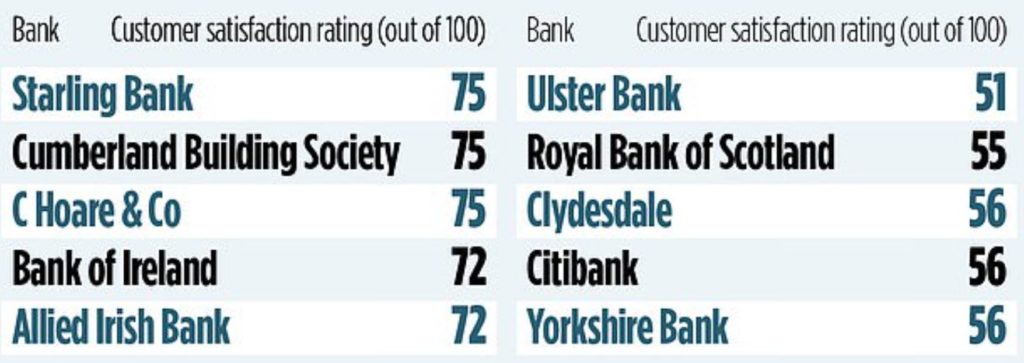
Following on from why startups will fail if they compete head-to-head with a bank, I got this headline the other day saying that smaller banks have the happiest customers.
The latest analysis of feedback and complaints data conducted by consumer website Fairer Finance shows that big brands such as Halifax, Nationwide, HSBC and NatWest have struggled to meet customers' expectations. In contrast, new mobile bank Starling Bank, Cumberland Building Society and C Hoare & Co – the country's oldest privately owned bank – have continued to deliver service par excellence.
Why would that be?
Customer focus? User experience? Treating customers fairly? Being there?
All of those things, but the most fundamental is focus.
When I look at the list of best and worst in British banking …
… it strikes me that smaller banks are trying to compete harder. As a result, of course they focus more.
If you were David and Goliath, who is going to worry more about the fight?
That’s the question and the answer is obvious. If you’re Goliath and you see some diddly-squat puny little punk walking towards you, you’re going to laugh. Thing is that the diddly-squat puny little punk is walking with a catapult or, in this case, a bottle of perfume.
Why a bottle of perfume? Because the smell of a bank will attract some people but not all.
There may be a sweet smell to some of the smaller banks, but they are not mainstream enough to be known and used by the masses. Equally, the bigger they grow, the harder it is to maintain that focus.
This is why the Goliaths of banking have not been toppled. They remain. They may be viewed as terrible and lacking customer empathy but, like the big telecoms firms, they hold the market. They have the power. They own the customer … or, at least, for now.
It reminds me of Warren Buffet’s investing strategy. Warren Buffett doesn’t use a value-based investing strategy. Warren Buffett finds companies who he believes are monopolies.
He invests in firms becoming monopolies; and he divests companies losing their monopoly situations.
If you take that as a bellwether, then it is interesting that in the summer of 2020 he divested investments in most US banks.
Warren Buffett's Berkshire Hathaway Inc said on Friday it has sold shares of some of the largest U.S. banks, slashing its stakes in Wells Fargo & Co and JPMorgan Chase & Co and exiting an investment in Goldman Sachs Group Inc.
Maybe the Goliaths are getting weaker?
At the end of the day, it’s all about horses for courses. We will invest and have accounts with the banks that suit us, and this is my core point.
There are lots of banks that suit different people. It’s horses for courses, some of which are faster horses! Starling Bank suits some people, but not all. They have no branches. The Cumberland Building Society suits some people, but not all. Who are they? And do I really want to bank with a Hoare?
For the masses of people, banking is a utility and simple choice: it’s the mainstream brand names that win. Can I trust you? Do I know you? Can I find you? Do you do the job?
This is why branches remain. Branches are not about service or advice, they are about trust, and being known and available.
That model of banking suits the mass of people and is the reason why the big bank Goliaths who offer average service beats the small bank David’s who offer exceptional service. Simples!
Chris M Skinner
Chris Skinner is best known as an independent commentator on the financial markets through his blog, TheFinanser.com, as author of the bestselling book Digital Bank, and Chair of the European networking forum the Financial Services Club. He has been voted one of the most influential people in banking by The Financial Brand (as well as one of the best blogs), a FinTech Titan (Next Bank), one of the Fintech Leaders you need to follow (City AM, Deluxe and Jax Finance), as well as one of the Top 40 most influential people in financial technology by the Wall Street Journal's Financial News. To learn more click here...


